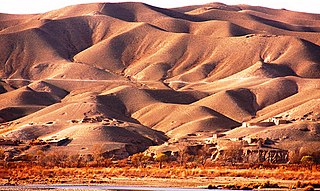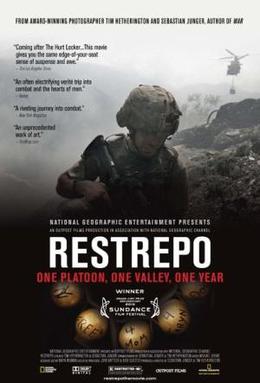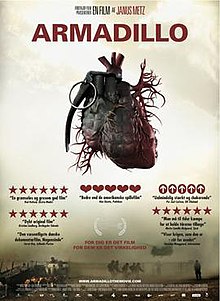
Jamie Doran is an Irish-Scottish independent documentary filmmaker and former BBC producer. He founded the multi award-winning company Clover Films, based in Windsor, in 2008. He is also the Club President of Datchet Village FC, which he founded in 1986.

Sangin is a town in Helmand province of Afghanistan, with a population of approximately 20,000 people. It is located on 32°4′24″N64°50′2″E in the valley of the Helmand River at 888 m (2,913 ft) altitude, 95 km (59 mi) to the north-east of Lashkargah. Sangin is notorious as one of the central locations of the opium trade in the south of the country, and is also a town that has traditionally supported the Taliban. It was described by British newspaper The Guardian as "the deadliest area in Afghanistan" in 2010. Sangin also houses the main bazaar for Sangin District. Route 611 passes through Sangin.

Musa Qala is a district in the north of Helmand Province, Afghanistan. Its population was around 57,500 in 2012 and are 97% ethnic Pashtun. The district centre is the village of Musa Qala; there are 19 other large villages and 200 smaller settlements, mostly along the Musa Qala River. The area is irrigated by the Helmand and Arghandab Valley Authority.

Operation Mountain Fury was a NATO-led operation begun on September 16, 2006 as a follow-up operation to Operation Medusa, to clear Taliban insurgents from the eastern provinces of Afghanistan. Another focus of the operation was to enable reconstruction projects such as schools, health-care facilities, and courthouses to take place in the targeted provinces.

The United Kingdom was one of the first countries to take part in Operation Enduring Freedom against the Taliban regime in autumn 2001.

Operation Herrick was the codename under which all British operations in the War in Afghanistan were conducted from 2002 to the end of combat operations in 2014. It consisted of the British contribution to the NATO-led International Security Assistance Force (ISAF), and support to the American-led Operation Enduring Freedom (OEF), within the South Asian country.

Forward Operating Base Salerno is a former forward operating base used by the United States Armed Forces from 2002 to 2013 during Operation Enduring Freedom. It is located in the southeastern province of Khost, Afghanistan, near the city of Khost. On 1 November 2013, U.S. forces withdrew from FOB Salerno and transferred control of the installation to the Afghan National Army.

Camp Shorabak is a former British Army airbase, located northwest of the city of Lashkargah in Helmand Province, Afghanistan. The camp was situated in a remote desert area, far from population centres.

Ross Kemp in Afghanistan is a Sky One British documentary series fronted by actor Ross Kemp about the British soldiers fighting in the War in Afghanistan as part of the International Security Assistance Force (ISAF) mission against the Taliban. The first two series involved Kemp and a small embedded film crew following troops fighting in Helmand Province, documenting their part in the ongoing Operation Herrick.

Operation Panchai Palang, or Panther's Claw, was a British-led military operation of the War in Afghanistan in Helmand Province in southern Afghanistan. It aimed to secure various canal and river crossings to establish a permanent International Security Assistance Force (ISAF) presence in the area. The commander of the operation declared the first stage a success on 27 July 2009.
The Battle of Dahaneh took place in the town of Dahaneh, Helmand Province, and its surrounding areas as part of the Afghanistan War. It began when U.S. and Afghan troops launched an Operation to capture the town from the Taliban, in the Helmand Province of Southern Afghanistan. Coalition troops met heavy resistance, and believe the Taliban were forewarned of the incoming attack, though they were successful in securing Dahaneh.
John D McHugh is an Irish photojournalist and filmmaker, and is based in London, England.
See also: 2007 in Afghanistan, other events of 2008, 2009 in Afghanistan and Timeline of the War in Afghanistan (2001-14).
The following lists events that happened during 2006 in Afghanistan.
Operation Moshtarak, also known as the Battle of Marjah, was an International Security Assistance Force (ISAF) pacification offensive in the town of Marjah, Helmand Province, Afghanistan. It involved a combined total of 15,000 Afghan, American, British, Canadian, Danish, and Estonian troops, constituting the largest joint operation of the War in Afghanistan up to that point. The purpose of the operation was to remove the Taliban from Marja, thus eliminating the last Taliban stronghold in central Helmand Province. The main target of the offensive was the town of Marjah, which had been controlled for years by the Taliban as well as drug traffickers.

Restrepo is a 2010 American documentary film about the War in Afghanistan directed by British photojournalist Tim Hetherington and American journalist Sebastian Junger. It explores the year that Junger and Hetherington spent, on assignment for Vanity Fair, in Afghanistan's Korengal Valley, embedded with the Second Platoon, B Company, 2nd Battalion, 503rd Infantry Regiment, 173rd Airborne Brigade Combat Team of the U.S. Army. The Second Platoon is depicted defending the outpost (OP) named after a platoon medic who was killed earlier in the campaign, PFC Juan Sebastián Restrepo, who was a Colombian-born naturalized U.S. citizen. The directors stated that the film is not a war advocacy documentary, they simply "wanted to capture the reality of the soldiers."

Forward Operating Base Budwan, or more simply, FOB Budwan, was a military base located near Gereshk, in the Helmand province of Afghanistan. It was occupied by International Security Assistance Force (ISAF) forces from the United Kingdom and Denmark as part of Task Force Helmand during Operation Herrick.

A War is a 2015 Danish war drama film written and directed by Tobias Lindholm, and starring Pilou Asbæk and Søren Malling. It tells the story of a Danish military company in Afghanistan that is fighting the Taliban while trying to protect the civilians, and how the commander is accused of having committed a war crime. The film was nominated for the Best Foreign Language Film at the 88th Academy Awards.

Shepherds of Helmand is a war film directed by Gary Mortensen. It premiered on February 3, 2011, by Lucky Forward Films. The documentary follows 17 men from the United States Army, Oregon Army National Guard who volunteered to train a kandak (battalion) of troops from the Afghan National Army. It was the winner of the "Best Documentary" at the Queen's World Film Festival, winner of the "Golden Ace Award" at the Las Vegas Film Festival, and the winner of the "Military Channel Award" at the 2011 GI Film Festival.















